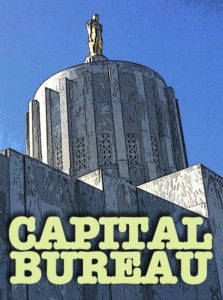By MICHAEL KOHN/Oregon Capital Bureau
An increasing number of Oregonians are concerned about the state of the economy, the latest case of public disillusionment with the direction the state is headed as voters head to the polls to choose a new governor and other state leaders next week.
 That’s the overarching theme from a survey from the Oregon Values and Beliefs Center, a nonpartisan group that releases periodic statewide surveys on issues ranging from the economy and the environment to politics and healthcare.
That’s the overarching theme from a survey from the Oregon Values and Beliefs Center, a nonpartisan group that releases periodic statewide surveys on issues ranging from the economy and the environment to politics and healthcare.
Those polled were asked how worried they are about Oregon’s economic future — 75% of those surveyed said they were either very or somewhat worried while just 23% said they were not at all or not too worried about the future of the state.
The overall perception that the economy is worse than it was a year ago could spell trouble for Democrats in the Nov. 8 general election. Political observers say the negative outlook on the economy is one reason why Republican gubernatorial candidate Christine Drazan has managed to keep pace with Democrat Tina Kotek in a state that historically votes blue in statewide elections.
The survey was conducted between Sept. 13-21 and involved 1,878 Oregon residents aged 18 and up. The margin of error is 2.3%.
When asked to rate the economic condition of Oregon’s economy today, 2% of respondents said it is “excellent,” 23% said it is “good,” 36% said “only fair,” 23% said it is “poor,” and 12% described it as “very poor.”
Most Oregonians (60%) that responded to the survey said it’s more important to maintain the natural environment to attract people and companies to Oregon, compared to 25% who said it would be better to relax environmental rules to make doing business easier.
The survey also showed that Oregonians were mostly split on how taxes should be spent — 26% of respondents said too much is spent on public services, 30% said the right amount is spent on public services and 30% said Oregon is not spending enough on public services.
When asked what issue elected leaders need to focus on most, homelessness was listed as the most important issue, with 35% of respondents putting it at the top of the list. Housing, crime, inflation, and climate change were other listed concerns.



